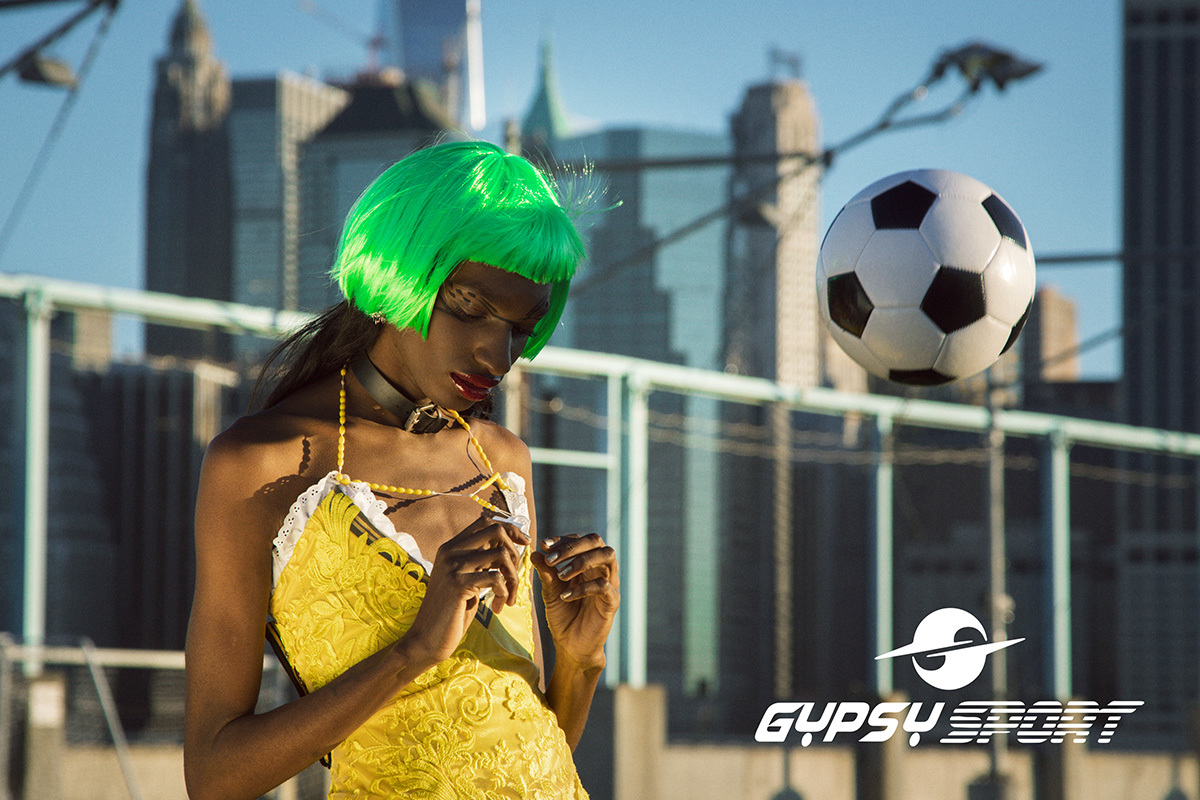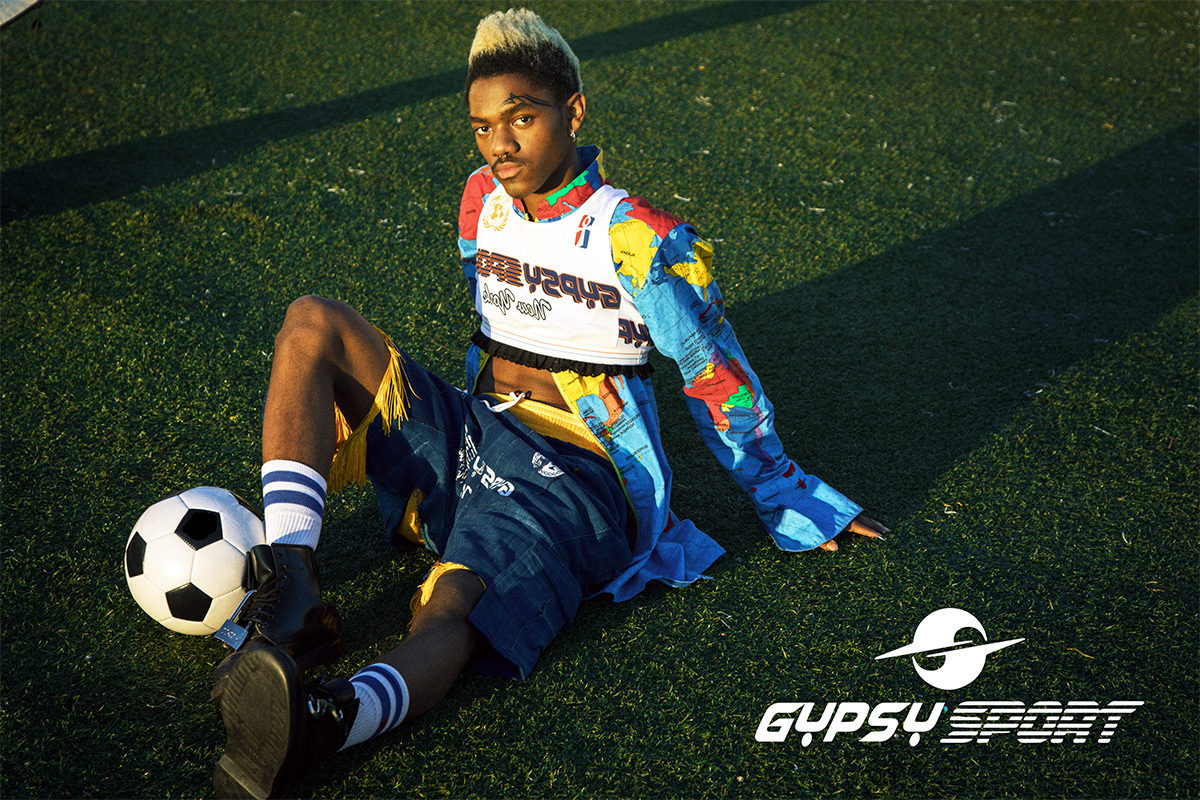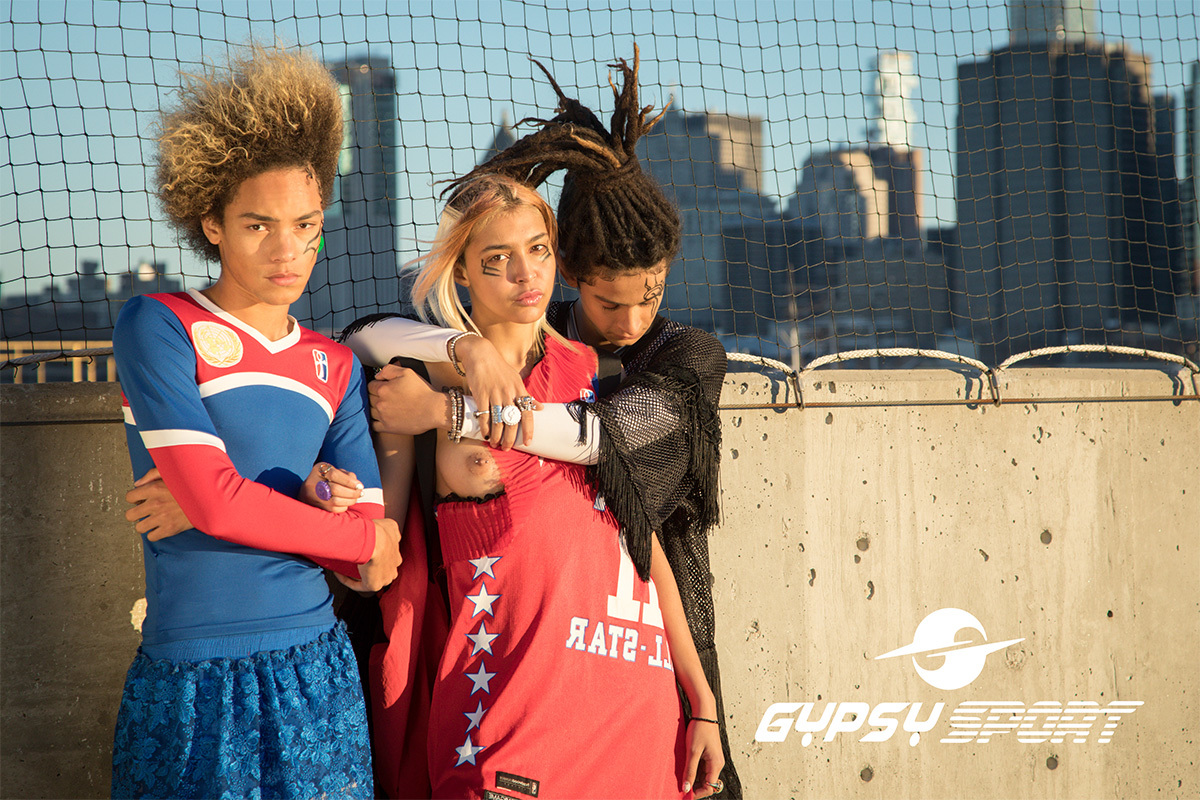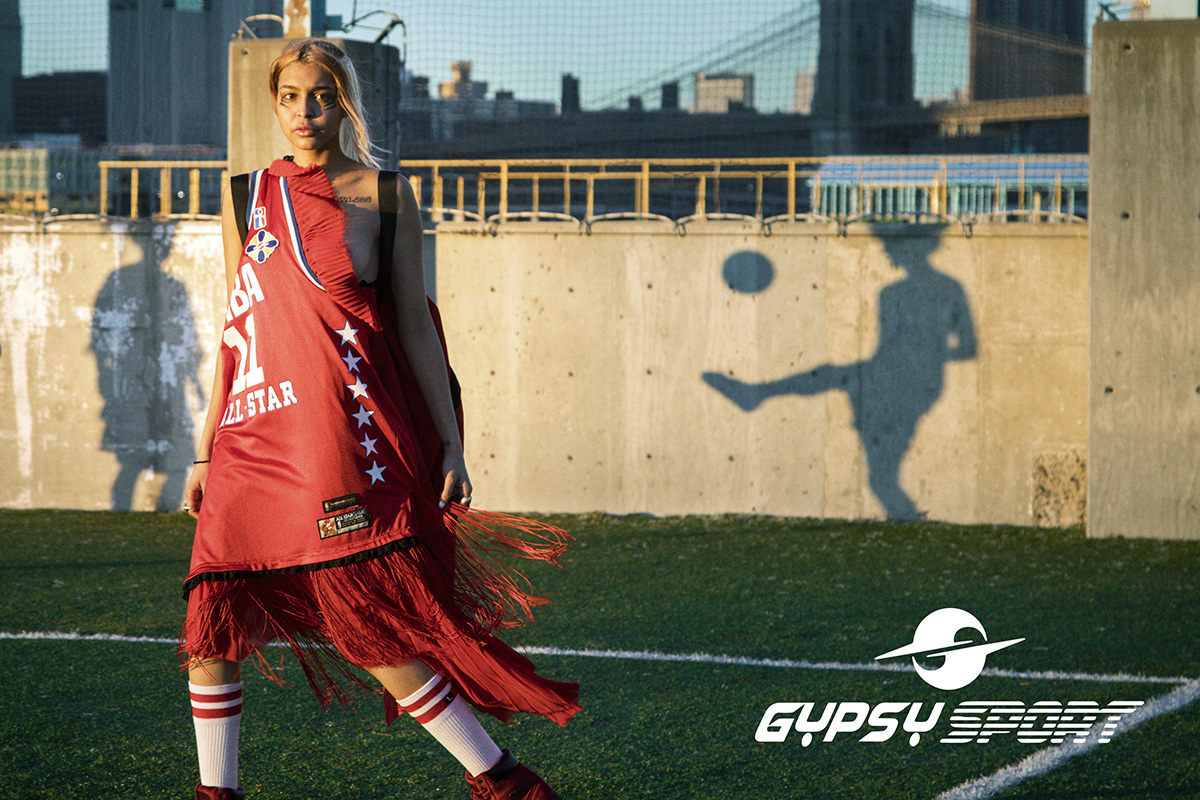It’s impossible to talk about Gypsy Sport without using the word ‘community.’ Founded by Rio Uribe in 2012, the New York-based label prides itself on the nomad’s land of friends-cum-collaborators that orbit around its Garment District basement. An eclectic mix of freaks, geeks, cool kids, and even cooler kids, it has, in many ways, become a microcosm of the city that spawned it.
“There’s a scene in Star Wars where they go to a bar and every kind of alien from the whole universe is sitting there and having a drink. That’s New York,” says Uribe proudly. What’s more, he could quite easily be talking about his own fiercely inclusive brand. Pan-racial, pan-gender, pan-everything-going, Gypsy Sport’s boundary-breaking mentality thrives on the similarities in our difference. “I work with my friends on the marketing, on the branding, on the photography, all of those fields where they get a chance to practice what they love and I get to do what I love,” describes Uribe, who was awarded the CFDA/Vogue Fashion Fund in 2015. “And when friends come from all over the world and you’re working together, it kind of just brings a natural sense of community and diversity to your team.”
As Uribe’s tribe continues to expand beyond its original Harlem home — an L.A. office is currently in the works — what does he hope the brand’s lasting legacy will be? “I would just really love it if, years later, people recognize Gypsy Sport as something that really pushed the boundaries and really tried to bring more people into the fashion industry,” he says. “I wanted all my life to be a designer but I didn’t know if it was possible. I hope that we can inspire other people to do it too.”

What was the message you wanted to convey through the new campaign then?
So, the campaign was shot on a huge soccer field in Brooklyn with this really nice view of the city. Every season, the campaign represents a tribe of kids or people in the world. But because we only have access to the people living in New York City, I like to make it feel and look as international as possible, I guess, without losing the accent of New York City or a metropolitan city. So the feeling is just about kids who travel the world. International kids.
And who are the kids involved this time? We spotted Torraine Futurum.
Torraine’s in there. She’s awesome. I cast Torraine because we’ve had her in a few of the shows and she exudes a certain confidence that many models don’t have. She also is very active in the support of trans rights and civil rights. That’s cool as fuck to me. Adriano, with dreadlocks, I met while he was skateboarding outside my studio. We smoked a joint together and he was totally down to model. He’s a smart guy with sick style — 100% authentic. Odalys, the girl in red, is such a muse of mine. She’s pretty and fit but also very brave and adventurous. Odalys has been DJing underground parties since she was 15 and has always been comfortable in her own skin. I see a bright future for her. Phoenix is the only one that we booked through an agency, however he’s special to me because he’s very androgynous but also a star athlete in high school. He’s a beast on the field and this collection was a mash-up of soccer and 1920s flappers, so he was definitely in his element. There’s one shot where he held the ball up on the tip of his toe for 10 straight minutes! And Eddy is another muse of mine. He’s a proud black, gay boy with amazing personal style and self-confidence. He’s a photographer, but he loves Gypsy Sport and he wears it so well. When I’m casting for the shows or a campaign I always aim to find authenticity. Real people who are part gypsy, and part sporty.

How do you go about balancing the more avant garde aspects of what you do with commerciality when you’re putting together a campaign?
To be totally honest with you, we never really consider it.
We thought you’d say that.
Yeah! That’s why we have cool pictures!
It’s been nearly five years since Gypsy Sport started. Has the meaning of the brand changed at all?
Yeah, a little bit. I mean, I think when we first started, I was very hardcore about Harlem. I was like, I want to represent Harlem, that’s what I’m inspired by. And as I expanded to Queens and Brooklyn, I realized that there were so many other parts that had so much culture and diversity that it became about New York as a whole. And I think every season and maybe every year we expand out a little bit on the world and try to tell a bigger story.
How important is teamwork to what you do?
It’s the only way we can get it done! For us, it’s natural because we work with friends so much. And when friends come from all over the world and you’re working together, it kind of just brings a natural sense of community and diversity to your team. And, at the same time, I can’t really afford to hire people who are super-professional because I just don’t have the money. So I work with my friends on the marketing, on the branding, on the photography, all of those fields where they get a chance to practice what they love and I get to do what I love and we get to work together.

What communities do you feel apart of outside of Gypsy Sport?
I guess we definitely hang out with the LGBTQ community. We have a lot of friends who are trans and gender non-conforming. We have a lot of friends who are immigrants or part of immigrant families. So that brings a total sense of diversity. It’s kind of a need prove something or be something because your parents came here for that. So you want to prove that you can be a model, be a designer, be whatever it is. And I would say anything that is anti-Trump. It’s kind of like a little group of outsiders that are bound together.
How important is that message of community in these first months of 2017?
It’s super important. When we started Gypsy Sport four years ago we were just happy to be on style.com. It wasn’t about the president or human beings any of that stuff. But now it’s very, very relevant. A lot of people in the United States are not happy about the way that the government is handling any of the situations that are coming to the forefront. So being that we have, like, Muslim people in our crew, we can’t support anything that’s anti-Islam, and the same goes for immigrants or gay people or anything really. It’s important. I would like to be one of the brands that doesn’t align itself with presidents or leaders.

Who buys into the Gypsy Sport brand?
I think we attract open people. Open-minded people. And I think we attract a lot of people who travel. Because I take a lot of style cues from around the world. The most recent example is a Korean girl I met who was like, ‘Oh, my God I love Gypsy Sport, a couple of seasons ago you made this skirt and that’s a very traditional Korean thing and my mom still wears that and I love it.’ And so I think people who recognize the cultural references will really like it and understand it. And then also there’s the whole gender non-conforming thing. I think a lot of our boys like to wear things that are called “girls” clothes, when they just want to wear something that’s not necessarily masculine. At the beginning, the first time Rihanna wore Gypsy Sport, I think we were all like, super, super psyched because it was a celebrity, but more and more as the industry becomes kind of transparent, I think people feel like we’re just gifting a bunch of clothes to Rihanna or Jaden Smith and that’s why they’re wearing them. That’s not the case. People actually approach and say what they want certain pieces, and we give them a discount. We can’t afford to give away clothes anyway, so it’s pretty cool that some celebrities support us on their own.

What happens next, Rio?
Next we’re actually opening up an office in California, in L.A. We did a bit of TV and film work, we did stuff with the Hunger Games in 2015 and last year we worked with VH1 on one of their TV shows. So I would really like to do a little more TV and film. Because people find something very theatrical about our fashion. And I’m cool with that. And it definitely makes us money! So I’m hoping that L.A.’s going to be good for that aspect, as kind of like the film area, and New York as the fashion field. And then hopefully next year it can open Paris and London and all kinds of cities.
What do you hope Gypsy Sport’s legacy will be?
Honestly, I don’t have an outline or a goal. I would just really love if, years later, people can recognize Gypsy Sport as something or a brand that really pushed the boundaries and really tried to include more people and bring more people into the fashion industry. I was hoping all my life to be a designer but I didn’t know if it was possible, because I didn’t go to school and there were so many roadblocks. I hope that we can inspire other people to do it too.
Credits
Text Matthew Whitehouse
Photography Jonathan Grassi
